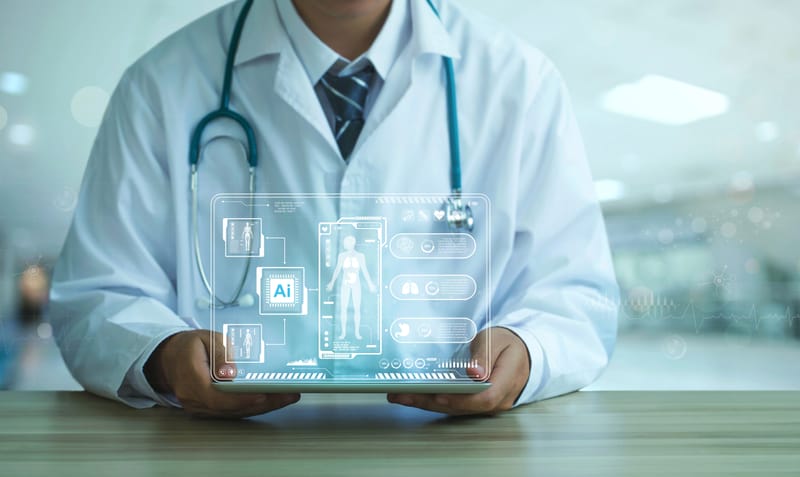Healthcare

Healthcare and Pharmaceutical Industry: Developments and Challenges
The healthcare and pharmaceutical industry is facing extensive developments and changes driven by technological advancements, demographic shifts, and increasing health demands. These developments bring both challenges and opportunities, necessitating adjustments in administrative practices as well as in research and development.
Digital Transformation and Technology Adoption
One of the central developments is digital transformation, driven by the introduction of technologies such as artificial intelligence (AI), machine learning, and big data analytics. These technologies enable more precise diagnoses, personalized medicine, and more efficient treatment pathways. However, challenges exist in handling data privacy, security, and the need to appropriately train and integrate medical personnel.
Personalized Medicine and Biotechnology
The shift towards personalized medicine, supported by advances in biotechnology and genomics, presents new opportunities for targeted therapies. These approaches can enhance treatment effectiveness and reduce side effects. Challenges include the high costs of developing and implementing such therapies and ethical considerations regarding genetic data.
Sustainability and Accessibility of Healthcare
Another focus is on sustainability and improving the accessibility of healthcare, especially in underserved regions. This requires innovative business models, partnerships, and technologies to provide cost-effective solutions. Challenges include financing and overcoming infrastructure barriers.
Changes in Research and Development
In research and development (R&D), technological advancements lead to faster and more precise development processes. The application of AI in R&D can lead to the identification of new drug targets and accelerated clinical trials. The challenge is to balance rapid innovation with comprehensive safety and efficacy testing of new drugs and therapies.
Administrative Practices
Administratively, the shift requires greater flexibility and adaptability. The digitization of processes enables more efficient workflows but also demands robust IT infrastructure and data protection measures. Increasing globalization and industry interconnectivity also require an international management approach and compliance with various regulatory requirements.
Our Experience in the Healthcare and Pharmaceutical Industry
Many of our employees have worked in automotive corporations or suppliers to automotive manufacturers. We have managed and directed project management for key departments in major German automotive corporations. Likewise, our requirements engineers are regularly involved in medium to long-term projects at various companies in the automotive industry.
Due to its versatility, this industry offers many opportunities for consulting support. Below are some of our possible services in the automotive industry.
Project Management
- Management of clinical trials: Coordination and monitoring of clinical trials, including scheduling, budgeting, and compliance with regulatory requirements.
- Product launch and market access: Planning and implementation of strategies for launching new products in the market.
- Healthcare stakeholder management: Communication and coordination with various stakeholders, including medical professionals, authorities, and patient organizations.
Process Management
- Optimization of manufacturing processes: Analysis and improvement of processes in production to increase efficiency, quality, and compliance.
- Supply chain management: Optimization of the supply chain to ensure reliable supply of medical products and pharmaceuticals.
- Quality management: Development and implementation of quality management systems to ensure compliance with standards such as GMP (Good Manufacturing Practice).
Requirements Engineering and Management
- Requirements management for medical devices and pharmaceuticals: Definition and documentation of requirements for products and systems, including technical, regulatory, and patient-related needs.
- Risk analysis and management: Evaluation and management of risks related to product development, manufacturing, and marketing.
- Validation and verification: Ensuring that products and systems meet defined requirements and standards.
System Modeling
- Modeling of healthcare systems: Development of models for healthcare systems to optimize processes, patient flows, and resource utilization.
- Data modeling and analysis: Utilization of data analysis and modeling to gain insights into treatment outcomes, patient behavior, and market trends.
- Simulation of production processes: Use of simulation software to optimize production facilities and processes in the pharmaceutical industry.
Software Development
- Development of healthcare information systems: Creation of software solutions for patient data management, appointment scheduling, and communication in healthcare.
- Development of medical applications: Programming of software for medical devices, diagnostic tools, and treatment support.
- Mobile health applications: Development of mobile applications to promote health monitoring, patient engagement, and telemedicine services.